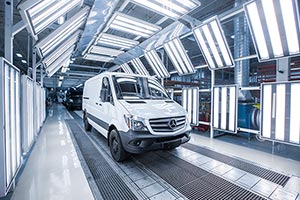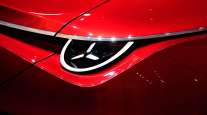Mercedes-Benz Vans Breaks Ground on $500 Million Sprinter Plant in South Carolina

 Mercedes-Benz Vans
Mercedes-Benz Vans NORTH CHARLESTON, S.C. — Mercedes-Benz Vans broke ground on its $500 million Sprinter plant for the North American market in North Charleston on July 27 as a company executive cited growing demand for Euro-style vans.
The plant will be an expansion of the company’s van assembly site. Mercedes-Benz executives said they expect to create up to 1,300 jobs with the facility. Production of the next-generation Sprinter is scheduled to start before the end of the decade, the company said.
Sprinter came to the U.S. market in 2001 as the pioneer in large, European-style vans. Demand has increased over the past few years in “a tremendous way,” Mathias Geisen, general manager of marketing and product management for the vans division, told Transport Topics. The van segment has been growing year-over-year, he said.
Mercedes-Benz is a brand of Stuttgart, Germany-based Daimler AG. The United States has become the second-largest market for Sprinter after Germany, the company said.
Vocational and trade applications represent a wide variety of customers for Mercedez-Benz Vans, Geisen said, adding that these businesses form a core group for the commercial van market, including general contractors, construction workers, plumbers, painters, electricians and heating/air-conditioning specialists.
It’s “important for us not only selling the Sprinter here in the U.S. but also building it right here in the U.S.,” Geisen said.
So far, Sprinter vans have been produced in German plants, the company said. Due to import tariffs, though, they’ve been partially dismantled before shipping to the United States, in what the company calls a time-consuming process, and then reassembled in North Charleston.
Since 2006, Mercedes-Benz has performed this “semi-knocked-down” assembly here for large, imported Sprinters, and since last year for the imported midsize Metris vans.
The local government offered the company incentives to build the Sprinter plant in North Charleston, a company spokesperson said.
Assumptions on pricing also are an issue, Geisen said. In Europe, people are used to seeing Mercedes-Benzes on the streets. Daimler is the world’s largest manufacturer of commercial vehicles, but in the United States, many people don’t know that, he said.
Here, Daimler sells its trucks under the Freightliner and Western Star brands rather than as Mercedes-Benz trucks. People don’t see the trucks “with the star on the hood,” Geisen said, but “in Europe, that’s completely normal.”
Therefore, the van division is working to overcome a challenge: potential customers who think its vans are expensive because Mercedes-Benz is considered a luxury automobile in the United States.
“We have to overcome that because — the price perception, not reality, but the price perception — is always, ‘I cannot go for Sprinter, I cannot go for Metris,’ ” he said, noting they think it will cost $50,000.
A plumber, for example, sees the famous circular hood logo and thinks it must be “a completely luxurious product, not affordable,” Geisen said, noting that’s not the case, particularly with the launch of its “Worker” model vans.
The company launched the SprinterWorker for $32,495 earlier this year, and now, the MetrisWorker for $25,995 to show they are competitively priced, he said.
Main competitors to the SprinterWorker are the Ford Transit XL 150 and Ram Promaster 1500-Low Roof.
In 2015, Mercedes-Benz Vans delivered about 28,600 units to U.S. customers, up 11% from 2014, the company said.
Among officials and speakers at the plant’s groundbreaking were South Carolina Gov. Nikki Haley; Volker Mornhinweg, head of Mercedes-Benz Vans; U.S. Sen. Lindsey Graham; and North Charleston Mayor Keith Summey.
“We are proud to say that Mercedes-Benz vans will now be made in South Carolina,” Haley said.
The plant’s body shop will be constructed first, followed by the paint shop and assembly lines later this year.
The Metris will remain a semi-knocked-down assembly for now, the company spokesperson said.



